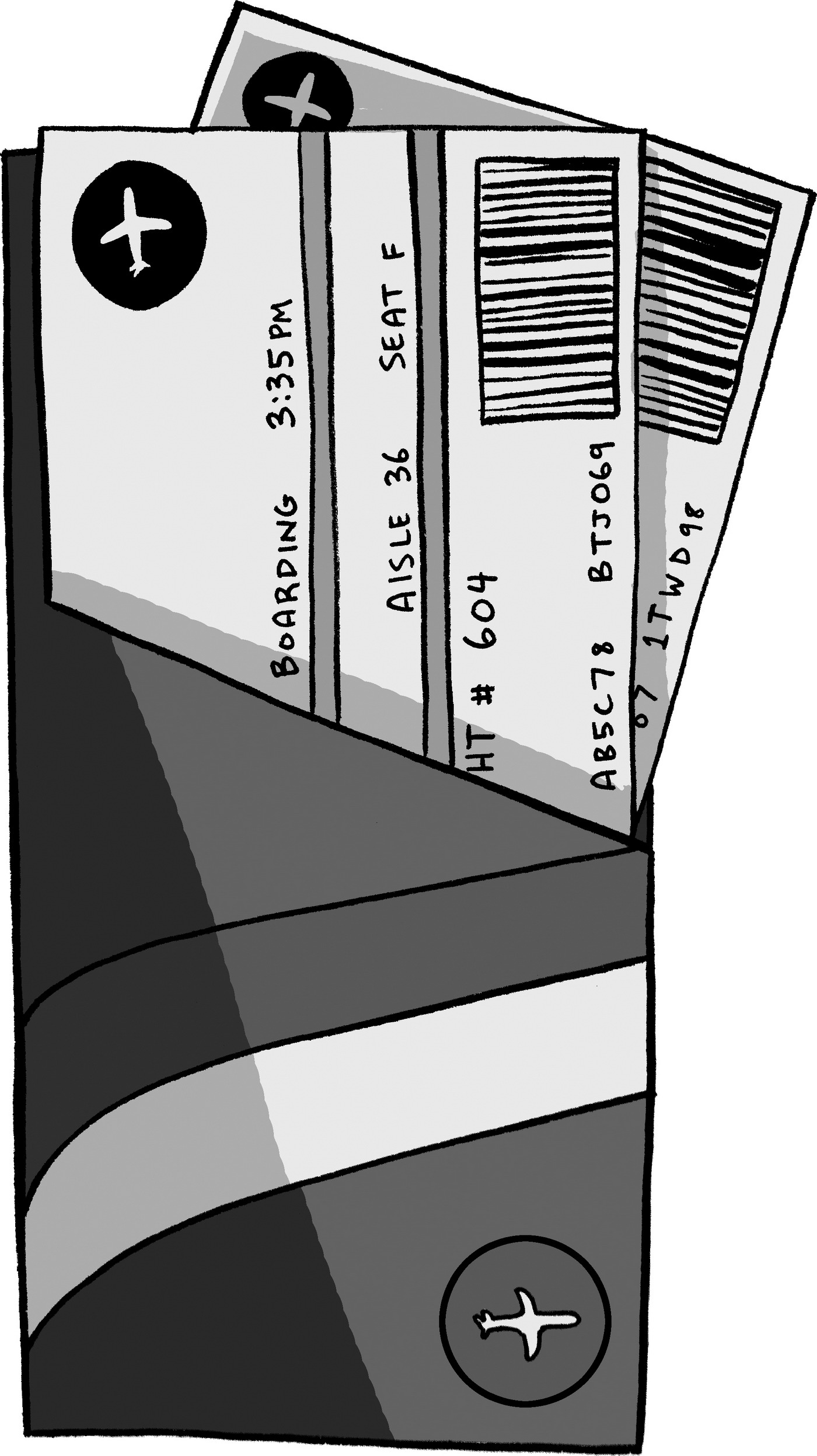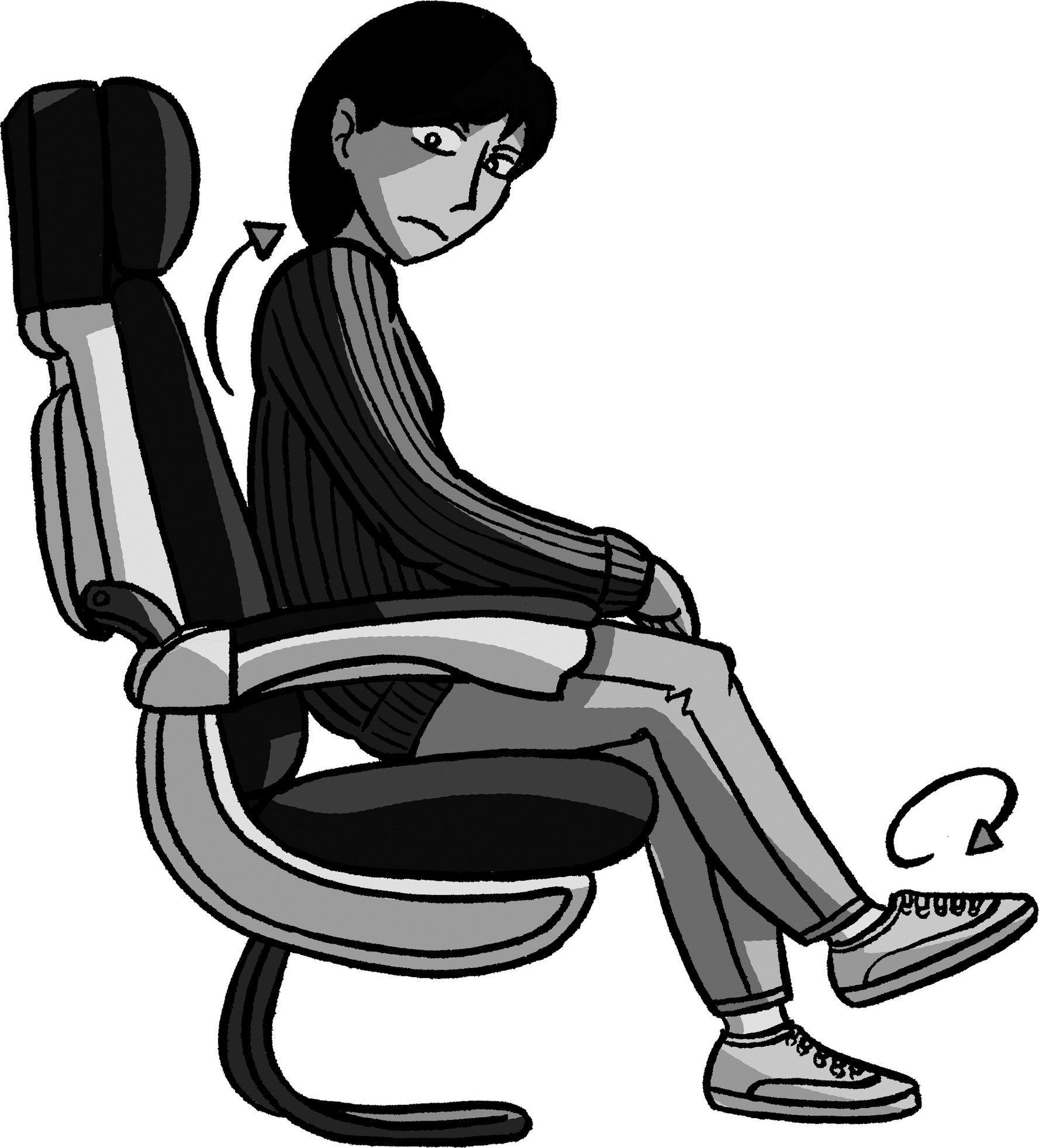Modes of Travel

WHEN YOU’RE PLANNING A TRIP, how you want to travel is just as important as where you want to go. If time is of the essence, nothing beats air travel. However, for those with the luxury of time, travel by sea, rail or road can offer a more leisurely and very enjoyable experience.

AIR
There was a time when flying was a luxury for the elite. Spacious seating, full meal service and a doting service crew—how I yearn for the glamour days of air travel! Things have changed, but there is a lot to be said for the convenience of modern air travel: you can now fly to the other side of the world in roughly fifteen hours on a non-stop flight.
BOOKING
With scores of online booking websites and apps, booking your own flight has never been easier. I may be old-fashioned, as I still prefer to employ the expertise of a travel agent who can navigate the rules and regulations for me (see this page), but if you have the time and inclination, booking a flight yourself can be a quick and economical option.

SEAT SELECTION
Reserve your seat as far in advance as you can. For peace of mind, I’ll pay the fee for seat selection to ensure that I don’t get stuck with the dreaded middle seat. Here are a few considerations:
The least motion during a flight is in the centre of the aircraft, and the most is in the back.
Bulkhead seats may have more legroom, but they also have much less bin space and no under-seat storage; this can be annoying. They are also often much narrower than regular seats because the tray table and entertainment unit are stored in the armrest instead of in front of the seat.
Seats in an emergency exit row and the row in front of it often do not recline, for safety reasons. Generally, seats in the last row of the aircraft do not recline either.
CHECK-IN
I believe the best way to engage with airline check-in agents is to be polite and friendly (which goes for all customer service personnel you interact with on your travels). Always have your documents ready before you approach the check-in desk, so that the process is as efficient as possible. This will put you in everyone’s good books.
Make sure your checked luggage is packed within the weight limits before you get to the agent at the counter. Airlines are strict today about luggage weight. If you’re an over-packer, weigh your luggage at home, or make a point of finding a luggage scale at the airport prior to check-in. If your luggage is overweight, do not inconvenience the agent and the other people behind you by unpacking your bags at the counter. Try to cram those extra-heavy items into your carry-on before approaching, and if that is not an option, courteously accept that you’ll have to pay the excess baggage fee.
AIRPORT SECURITY
How often have you stood in a security clearance line that feels as though it will never end, stuck behind someone who is totally unprepared and holding up the line? Here is how to move through security faster:
Have your boarding pass and passport ready for verification.
Dress so that your coat or jacket, belt and shoes are easy to remove.
Avoid clothing and accessories with metal, as they may set off the security alarm.
Remove your large electronic items, such as your laptop computer and tablet, from their cases and place them in the bins provided.
Pack your liquids in your carry-on according to the 3-1-1 rule (this page) and make sure they’re easy to access when you go through security.
Gather all your belongings quickly once they’ve passed through the scanner, and then move to one side to repack items, replace your shoes, etc.
Be polite to the security personnel.
DUTY-FREE
I have never been much of a duty-free shopper myself, but it seems airports today have become the new shopping malls. If you decide to engage in some duty-free shopping:
Give yourself plenty of time to shop. There is nothing more rude than shoppers who are impatient for service because their flight is about to depart.
Have your passport and boarding pass with you. You will need to present them at the time of purchase.
Don’t be alarmed by the aggressive sales clerks. Bear in mind that they often work on commission.
Always check ahead of time what you can and cannot bring home. Each country has different customs allowances for goods, tobacco and alcohol. If you exceed your allowance, be prepared to pay customs duty.
Keep your duty-free purchases with itemized receipts in their official security bags; keep these bags sealed.
Flights are not BYOB. Aviation regulations and federal laws prohibit the consumption of your own alcohol on board the plane.
FLIGHT DELAYS AND CANCELLATIONS
Unexpected delays or cancellations, along with lost or damaged luggage, are the bane of any traveller’s existence. While it’s all too tempting to vent your frustrations, don’t! Remember, your fellow passengers are all in the same boat, so remain calm (and count to ten, if that helps).
If you need to rebook your flight, try calling the airline while you also wait in line to talk to the agent in person. And be flexible with the available options. If it’s late and I’m definitely stuck, I’ll choose to spend the night at a hotel. At least I’ll get a good night’s sleep and feel ready to tackle the next day.

MISSED CONNECTIONS
There is almost nothing worse than missing a flight connection, and the stress and disruption it can add to your journey. Flights often get delayed, so if you have a tight connection, politely mention it to the flight attendant when you board. With luck, they will help you get off the plane first. Failing that, politely explain your circumstances to the passengers in front of you and ask for their assistance, and they may let you pass ahead of them.
HOW TO FLY LIKE A BUTLER

Eat something before you board. Never start your flight hungry. Avoid eating junk food before a long flight. Greasy and salty foods are even more difficult to digest when you’re in the air.

Always bring snacks with you for convenience, and in the event of flight delays.

If you would like or need a special meal, make sure you pre-order it. And be prepared to eat what you are given—the general meal service is no longer an option for you, even if it looks better. There is no guarantee that you will get your special meal so be flexible if there is a mix-up.

Always stay hydrated. This is one of the most important things to remember!

Be careful with caffeine. It is a diuretic and will dehydrate you. Herbal tea is a great substitute, or hot water with lemon slices—most airlines have lemon on the drinks cart.

Avoid drinking too much alcohol. It’s also a diuretic, and some experts say it prolongs jet lag.

Fewer airlines offer pillows and blankets so consider bringing your own, especially on long-haul flights. Remember to keep within your seat space; don’t lean your pillow against your neighbour. When you are done, neatly put them back in your bag.

Do discreet in-seat exercises such as ankle circles, knee lifts or neck and shoulder rolls every hour to ensure good blood circulation.

Don’t forget all your power cords and travel adapters so that you can stay connected. Bring your own headphones as well, as airlines rarely provide them free of charge.

Always wear a pair of comfortable closed-toe shoes. These are especially important in an emergency when you need to get off the plane.

AIRPLANE ETIQUETTE
Does the overhead bin belong to the person seated below it?
Technically no, but be respectful. Everyone is entitled to some space in the overhead bin, and it is polite to use the bin located closest to your own seat.
If I am sitting in the middle seat, who gets the armrest on either side of my seat? As the middle passenger, you get the inside armrests, as the passenger on either side has an outer armrest.
What kind of food can I bring on board to eat during my flight? Since meals are rarely served on flights now, and the buy-on-board options are generally not very good, it is common for passengers to bring their own food on the plane. Consider your fellow passengers, and select a meal that creates minimal smell and mess. Sandwiches or wraps make ideal choices, since they can be eaten unheated and without cutlery.
How do I deal with the person sitting in front of me who fully reclines his seat? This can be frustrating but all passengers do have the right to recline their seat. During meal service, it is acceptable to ask the passenger in front of you to put his seat upright. And if you are uncomfortable asking, politely mention this to the flight attendant, who will ask on your behalf.
The child behind me keeps kicking the back of my seat. What should I do? The most important thing is to stay calm and be as empathetic as possible. Address the parents politely and say something like, “Do you mind asking your child to stop kicking my seat, please? Thank you. I’m trying to have a nap.”
How do I handle the chatty passenger seated beside me? I remember getting great advice on this very topic from the late Letitia Baldrige, who advised saying something like, “It is wonderful to meet you, but if you don’t mind, I really want to get back to my book. It’s so riveting, and I want to keep reading!”
A family has asked me to swap seats with them so that they can all sit together. Do I have to give up my seat? The short answer is no, but put yourself in the other person’s shoes. It’s always nice to sit with someone you know.
My family are seated separately but we would rather sit together. How do we best arrange to change seats? Approach the gate agents to see if they can help. If they can’t, then ask a flight attendant upon boarding. If you need to ask a fellow passenger to move, remember that you are asking for a favour, and that they may have paid extra to secure that seat. Politely and sincerely ask, “Do you mind?” or “Could you help us, please?” You will find most travellers will be accommodating.
How do I navigate around a sleeping passenger? As tempting as it is to try to climb over someone without disturbing them, it is always best to tap them gently on the shoulder and excuse yourself. You wouldn’t want the passenger to wake up as you’re straddled over them, struggling to get out to the aisle.
Is it appropriate to tip a flight attendant if they go above and beyond the call of duty? No; as Amy Vanderbilt put it: “No member of a plane’s personnel is ever tipped. One says good-bye to the crew in attendance at the jet bridge when debarking.”
PRIVATE AIRPLANE
If you are fortunate enough to be invited on board a private jet, here are some things you should know:
Guest “Do”s |
Guest “Don’t”s |
Dress appropriately. Unless you are travelling with immediate family, business or business casual is your best bet. |
Do not forget your passport or any other required travel documents. |
Wait for the host before you take a seat. |
Do not be late, and never keep your host waiting. |
Obey safety rules; wear your seatbelt. |
Do not ask the host or crew inappropriate questions, such as the cost of the flight. |
Be on your best behaviour. Sit quietly during the flight, and drink alcohol only in moderation. |
Do not expect the same service you would receive on a commercial aircraft. |
Keep yourself busy, and bring your own reading material or personal electronic device. |
Do not travel if you are sick. You do not want to risk infecting your host and other passengers. |
Limit your luggage. |
Do not wear strong scents on board the flight as they can be overwhelming. |
Declare everything you purchase. Flying privately does not make you exempt from customs regulations. |
Do not brag about your experience by taking photos and posting on social media. |
Send a thank-you note to your host after the trip. |
Do not bring a gift for the host; there is limited space on board. |
RAIL
Train travel has never been as popular an option in North America as it is in Europe and Asia, and I suspect that has something to do with the long distances between cities. Nonetheless, the romance of train travel is very appealing to me. The journey may take longer, but watching the landscape change through the window as you roll through the countryside is mesmerizing!
Whether you are travelling on a transcontinental or any other type of train, here are some guidelines to follow to help ensure that everyone has a good trip.

Should I offer my seat to pregnant women, older people and those with disabilities? I rarely see this happen any more. Chivalry is not dead! If you are sitting in a carriage of unreserved seating, then the younger and more able-bodied should always offer their seat to others who need it more than they do. It’s the right thing to do.
Am I required to tip during train travel? Whom do I tip, and how much? It’s not required, but service crew personnel might be tipped based on the quality of service received. Consider $10-$20 for the car attendant, $5-$20 for the sleeping car attendant, 10 per cent for the snack bar attendant and 15 per cent for dining car staff. Train station porters should be tipped $1 per bag.
Is the Orient Express still as formal as it once was? The Venice Simplon-Orient-Express is still the epitome of luxury train travel. The journey on board vintage carriages has retained the romance, glamour and service of a bygone era. Smart and formal attire is de rigueur.
What can I do when someone is speaking loudly and is rudely bothering everyone in the train car? A crowded train car, in my opinion, is most likely not a good place to confront someone regarding their behaviour. Try to stay focused on your book or electronic device, and hopefully the disruption will come to an end quickly. If you do need to bring it up with someone, always speak discreetly to a train official. They are trained to deal with these situations.
CAR
North Americans love to travel by car. I personally love a good road trip, especially when we all agree on who is going to drive and the type of music to listen to!
So, how do you plan a successful road trip? Well, first you need to decide if it is going to be a leisurely journey with stops along the way, or a mission to get as quickly as possible from point A to point B. This will dictate the route you will take and the pace of your drive.
When I used to drive frequently between Toronto and New York City I found that the eight-hour drive went by relatively quickly if I was on the road no later than 6:00 a.m. The early start time meant that there was less traffic to contend with, and by the time I arrived at 2:00 p.m. I had the rest of my day to enjoy the city.

If we take my car on a road trip, is it fair for me to ask others to share the driving? Perfectly fair. The key is to discuss expectations ahead of time, so that everyone is in agreement before you set out.
When I drive my friend’s car on our road trip, she is always complaining about how fast I am going. I tell her when I drive it’s my way, and when she drives it’s her way. Is this fair? In this case, you must respect your friend’s wishes: her car, her rules.
My children often fight on road trips. How do I deal with this? Plan ahead and have activities on hand to keep them entertained. Videos, video games and tablets are options, but don’t forget crayons, paper, colouring books, car games, toys and books. And plenty of snacks.
Should I drive my own car or rent a car for a road trip? Well, it depends. Does your car meet your family’s needs, and is it in good condition? If the answer is yes, then save the cost of a rental car by using your own.
COACH
Whenever I think of travelling by coach, I fondly recall my high school trip to Italy. Touring the country by coach was a fantastic experience, and we were even lucky enough to attend the Wednesday Papal Audience with Pope John Paul II. But coach travel also makes me think of the movie If It’s Tuesday, This Must Be Belgium, which captures the whirlwind experience of travelling by coach perfectly. It can be fun, but it can also be exhausting, and no matter how much you like the people you are travelling with, they will probably get on your nerves.
If you are on a budget, travelling by coach is a great option, and coach tours offer many benefits for the first-time traveller to an unknown destination. Coach travel also provides a safe way to meet new people and make friends from other parts of the world. And it’s also the easiest way to see the sights, especially if you don’t speak the local language. Experienced guides will tour the group and offer advice on the best way to experience your destination. And since tour operators usually have pre-arranged priority entry, you can skip the lines.

Is a coach tour a good idea for a family with children? As with car travel, your children will be confined to their seats, but on a coach you do not have the flexibility of taking breaks when it suits them. Look into child- or family-friendly tours that will cater specifically to their interests. That way, you’ll be travelling with like-minded passengers.
Does a coach tour bus offer any amenities? Coach tour buses are air-conditioned and often have reclining seats with generous legroom. There is usually a washroom on board, and most have free Wi-Fi.
CRUISE
Transcontinental leisure travel was once dominated by large ocean liners. When air travel became more popular and affordable, ocean liner travel declined, and in came the cruise ship. Cruise ships travel to several destinations in one voyage and offer an array of onboard experiences to appeal to the interests and personalities of as many travellers as possible. Today’s full-service cruise ships (remember The Love Boat?) are huge vessels, offering more amenities and entertainments than you can imagine.
As appealing as this sounds, there are a few disadvantages to cruising: cabins are notoriously small, you will be sharing a table for meals, and there is always the possibility of seasickness and bad weather.


How should I dress aboard a cruise? Follow the dress-code guidelines of the ship. As I heard it said once, “Dress for a cruise, not a car wash!” A bit harsh, but the point is to dress appropriately—you certainly don’t want to make yourself or others feel uncomfortable.
Do I need to bring a jacket and tie? It is always good practice to have one in your suitcase. You may not use it, but if you end up being invited to the captain’s table, you will be prepared.
What are my responsibilities towards the other guests at my dinner table? First, introduce yourself to your new dining companions. Be polite, smile, acknowledge everyone, listen, participate in conversation and mind your table manners.
What if I don’t like the guests at my table? No matter what, you must be polite. However, if you do not think you can continue to be seated at the same table, speak privately with the maître d’hôtel and have him change your table assignment, preferably to a table far away from your former dining mates to avoid awkward encounters in future.
How much, whom and when should I tip while on board? Tipping standards vary depending on the cruise. When you book your cruise, check the terms and policies. Some cruise ships include the tip in the fare or allow you to charge your tips to your onboard account. If an employee goes above and beyond the call of duty, an extra gratuity is always appropriate. In this case, give the tip discreetly to the employee in an envelope (use the ship’s tip envelopes if available). The crew members to tip are the butlers, cabin stewards and dining room staff.
YACHT
If you are planning to travel by private yacht, lucky you! It will be an incredibly luxurious experience. The service is generally exceptional. Though the cost would set many of us reeling, if you have the means it’s well worth it.

How do I charter a yacht? It is best to find an established charter broker who will match a yacht to your needs and expectations. If you’re not sure whom to contact, refer to professional organizations such as MYBA The Worldwide Yachting Association, which has a list of vetted members. The broker will do an in-depth review of your requirements and present several options to you based on the information you provide.
How do I check references? If possible, talk to previous clients. Have a list of questions prepared in advance and make sure they are open-ended so that you get meaningful and detailed answers. For example, instead of asking “Do they handle dietary restrictions?” you might ask “How did they handle special dietary restrictions?”
What do I do if I’m not happy with the service? Always speak to the captain if there is a problem, and address issues as they arise so that they can be dealt with immediately. Remember, be reasonable and courteous in your communication (this page).

